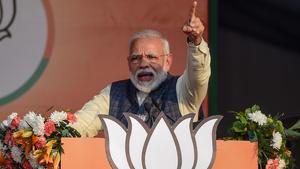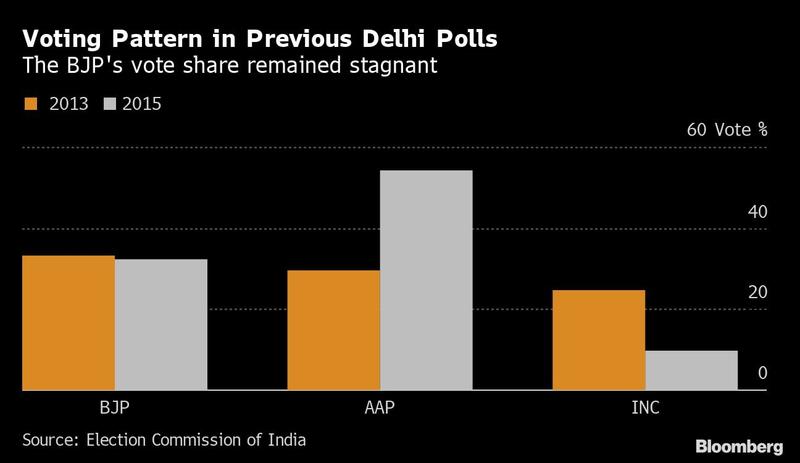 In this photo taken on Feb 3, 2020, India's Prime Minister and Bharatiya Janata Party (BJP) leader Narendra Modi gestures as he speaks during a rally for the upcoming Delhi state elections in New Delhi. (MONEY SHARMA / AFP)
In this photo taken on Feb 3, 2020, India's Prime Minister and Bharatiya Janata Party (BJP) leader Narendra Modi gestures as he speaks during a rally for the upcoming Delhi state elections in New Delhi. (MONEY SHARMA / AFP)
Prime Minister Narendra Modi’s Bharatiya Janata Party is set for a tough fight in the Delhi state election this weekend, marking the first major test at the polls of his religion-based citizenship law that’s spurred nationwide protests.
About 14.6 million voters are expected to cast their votes to elect 70 members to the legislative assembly on Saturday and results are expected on Feb 11, according to the Election Commission of India.
ALSO READ: India's BJP wins in big western state, scouts for ally in other
About 14.6 million voters are expected to cast their votes to elect 70 members to the legislative assembly on Saturday and results are expected on Feb 11
If the incumbent Aam Aadmi Party retains power in the capital region, it will be the third straight electoral setback for Modi, whose party lost control in the states of Jharkhand and Maharashtra last year. AAP is projected to take 54-60 of the 70 assembly seats, down from 67 in the 2015 elections, while the BJP will likely win 10-14, up from three seats previously, according to a Times Now-IPSOS poll released on Monday.
The ruling party’s campaign in Delhi, where the BJP last formed a government in 1998, was marked by divisive speeches and calls to violence. Junior finance minister Anurag Thakur was barred from campaigning by the Election Commission after he exhorted crowds to shoot so-called traitors to the nation, alluding to those protesting the Citizenship Amendment Act. The city saw at least three shooting attacks near the protest site ahead of the poll.
The new religion-based citizenship act, which was passed by an overwhelming majority in the parliament, fast-tracks religious minorities from three neighboring countries, but excludes Muslims. Protesters say the law undermines India’s secular constitution while the government says its aim is to protect persecuted minorities. The push-back against the law has been Modi’s biggest challenge since he swept to a second term last year.
 (BLOOMBERG GRAPHICS)
(BLOOMBERG GRAPHICS)
The Aam Aadmi Party, formed in 2012 after a popular anti-corruption movement, focused its campaign on local civic issues including water supply and education.
The attention on the protests “may have caused some increase in BJP support, but not enough to bridge the gap to gain power or unseat AAP,” said Sandeep Shastri, pro vice chancellor of Bengaluru-based Jain University and National Coordinator of Lokniti Network, whose pre-poll governance survey conducted in November and December showed a majority of Delhi citizens were satisfied with the current government.
“For the last two years at least, Indian voters have been making a very clear distinction by voting in a different government in the state and for Modi at the national level,” Shastri said. “The BJP is attempting to change this discourse by refocusing attention on national issues and national leaders in Delhi.”
Protests Targeted
New Delhi’s Shaheen Bagh neighborhood, where Muslim women and students and activists from all religions have been protesting since December, became the target of speeches by the BJP’s star campaigners including home minister Amit Shah and Modi himself.
At an election rally in Delhi on Monday Modi accused the AAP and Congress party of “playing games with Indian democracy” and said “the protests in Shaheen Bagh are not a coincidence, but a political experiment.”
BJP spokesman Gopal Krishna Agarwal said the party would not shy away from the religious aspects of the debate. “Making it a Hindu-Muslim issue is being done by the opposition,” Agarwal said Friday. “Our leaders have ideological commitment and they will speak what they think is right for the cause.“
The Aam Aadmi Party sought a ban on campaigning by Yogi Adityanath, the BJP chief minister of India’s biggest state Uttar Pradesh, for claiming Delhi’s chief minister Arvind Kejriwal had links with Pakistan.
READ MORE: Gunman fires at Indian protesters after threatening on Facebook
Kejriwal accused the BJP of trying to polarize votes to win the election. “AAP voters are those who want good education, medical treatment, modern roads, 24-hour electricity,” Kejriwal told the Press Trust of India on Thursday, the last day of campaigning.
AAP’s spokesman Saurabh Bharadwaj didn’t immediately reply to an email seeking comment.
Shastri said the Lokniti study showed a significant chunk of BJP voters from the 2019 federal elections plan to vote for AAP this election. “BJP has a core vote of 33-34% in Delhi but when it comes to state elections, local issues, performance and even economics dominate.”


